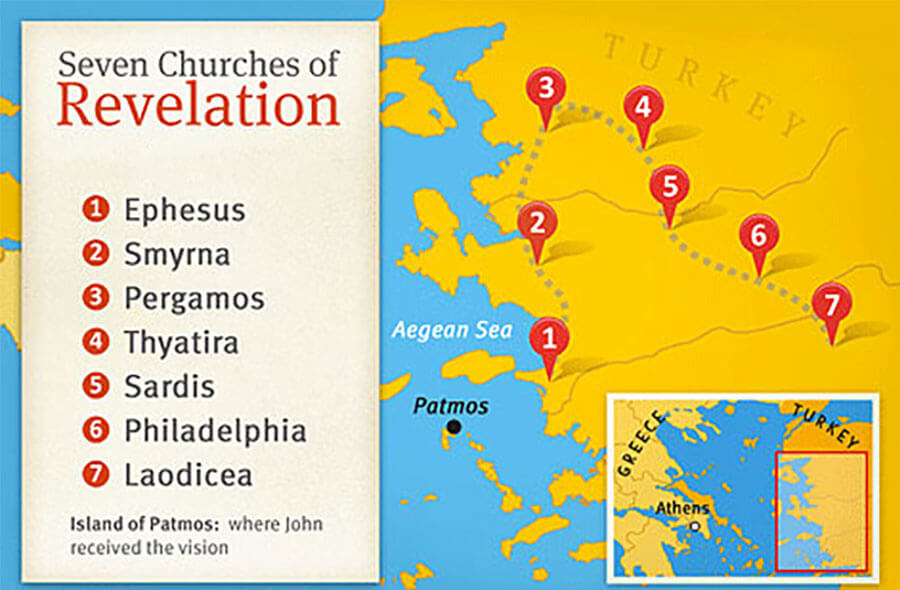
Seven Church Conditions during the Church Age – The Dying Congregation
As we study the prophetic messages to the seven congregations in this series, we will quickly see that they follow the same well-defined structure. The Lord begins each message with a greeting that relates back to John’s vision of Jesus, the Son of Man, in the heavenly scene in the first chapter of the Revelation. In other words, Jesus greets each congregation with an aspect of His person or His title that relates who He is to their particular circumstance. Jesus then commends the congregation for the good things He can say to them. Jesus then exhorted the congregations to take the appropriate action with a promise of blessings for obedience. The believers were to overcome must be understood within the context of the struggles and temptations each congregation faced. Furthermore, the Lord connects the congregation’s spiritual condition with the city’s character and reputation in each letter. (2)
Because the believers were being persecuted, the Lord wanted to encourage them as well as challenge them in areas where they were failing to live up to their high calling. He introduced Himself as the exalted Son of Man in a way that related to their individual situations, both physically and spiritually. He gave each congregation a word of promise to the overcomers and a warning of consequences if they did not obey His instructions. It is most important that we realize His words of promise were not to those who failed to repent. The Lord only had harsh words to those who were carnal and lukewarm in their commitment. The Lord did not give any of these congregations a watered-down, seeker-friendly, entertaining message. The very survival of the Lord’s work in the city depended on the believers responding positively to what the Lord told them. He promised blessings to the overcomers but chastening to those who did not heed His message. (2)
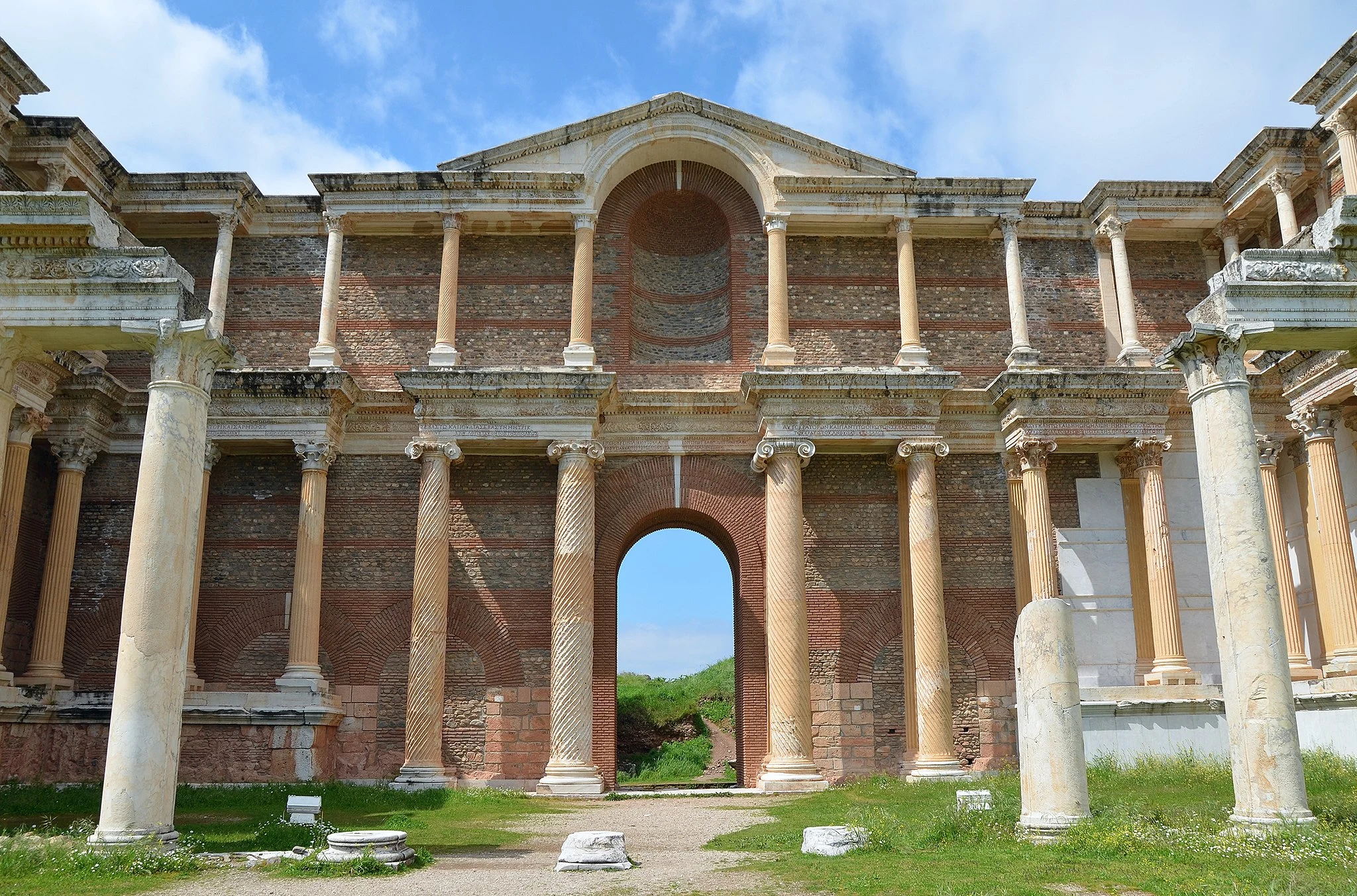
The Congregation at Sardis
With this introduction, let’s get some background information about Sardis that will help us understand why the Lord said what He did to the believers in this strategic city. Then we will study this prophetic message with a view of its practical application to our world and lives today. (2)
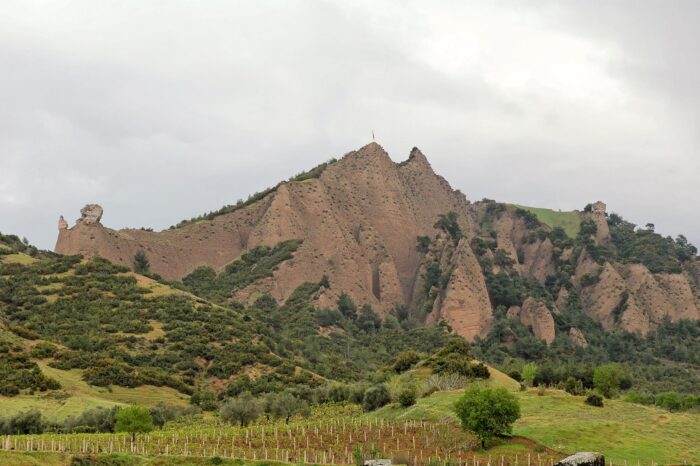
Background
After John’s letter was read to the congregation at Thyatira, God’s special courier traveled about 35 miles southeast to Sardis. In its early history, Sardis had been a very powerful and prosperous city. It was the capital of the ancient kingdom of Lydia and was famous for its wealth. The prominent feature of Sardis was its elevation. The citadel of Sardis was built on top of a 400-foot-high hill that was protected by steep cliffs thought impossible to climb. Because of its location, the citizens of Sardis considered the city to be an impenetrable fortress. When the city was attacked, the citizens living in the valley below would flee to the citadel for refuge. A good example like Sardis we can relate to is Masada in Israel. (2)
Since the citizens of Sardis felt so secure from enemy attacks, they failed to provide watchmen to guard the city. They went to sleep happily, thinking they were safe and secure. But it was a false sense of security. The citadel was attacked at night on two different occasions. In 547 B.C., the Persian King Cyrus made a surprise attack and captured the city. Sardis then became the seat of the Persian governor for the region. Later, when Alexander approached the city, the Persian leaders came out of the citadel and surrendered to him without a fight. Then, around 214 B.C., Antiochus the Great captured the city in another surprise night attack. Antiochus eventually abandoned Sardis, at which time it came under the rule of the Pergamos kingdom, and finally, under the rule of Rome. (2)
Sardis was destroyed by a catastrophic earthquake in A.D. 17. Since Sardis was a Roman province, the Roman Emperor Tiberius made a generous donation to help rebuild the city. As a show of gratitude, Sardis petitioned Rome to build a temple for imperial cult worship, but the petition was denied. Historians explain that the Sardis appeal was based on their past glory and greatness rather than on an expectation of future prosperity. (2)
The name Sardis means renewal. It had a name and reputation of greatness in the past but was now struggling to renew itself. With help from Tiberius, Sardis had recovered to a degree but was no longer prominent as it had been in the past. Compared to its former glory, Sardis was in a gradual state of decline, and in some ways was a dead city. (2)
At the bottom of the citadel in the lower city, there was a theater, a stadium, and a huge temple to the goddess Artemis. Artemis was the Greek name of Diana, the goddess of fertility. Archaeologists and historians tell us that the temple to Artemis was so great that it had never actually been completely finished. It was the largest Greek temple in the ancient world. Some of the columns of the temple are still standing today. As with all idolatry, the worship of Artemis was accompanied by gross immorality and every imaginable form of depravity. (2)
Sardis was well known for its textile industry, and its people claimed to have discovered the art of dyeing wool. It was a major manufacturing center of everyday garments worn by common people, plus a white garment worn by both priests and ordinary people at religious ceremonies and in victory parades. This would include the many priests who served at the temple to Artemis. (2)
There was a large Jewish community at Sardis. Archaeologists have uncovered the synagogue, which was one of the largest in the ancient world. Apparently, Sardis was one of the few cities where the Jews and early believers coexisted peaceably. (2)
Today, Sardis lies entirely in ruins and is an archaeological site near the small village named Sart. The main ruins are of the synagogue, the temple to Artemis, and a Byzantine church building. With this brief background, let’s read the prophetic message from the Son of Man to the congregation at Sardis. (2)
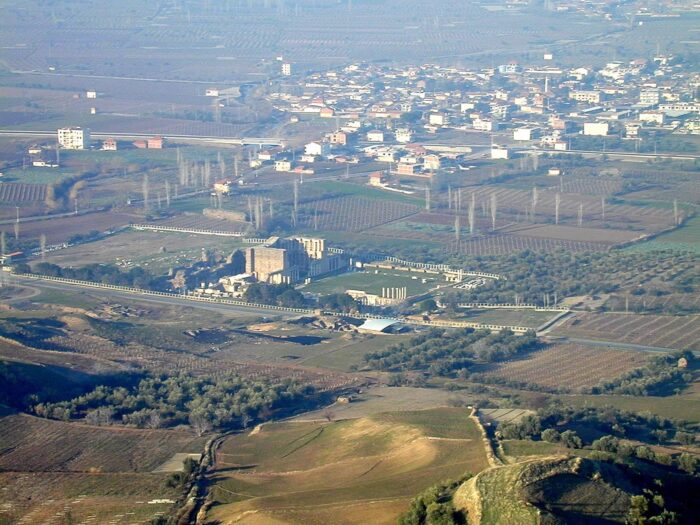
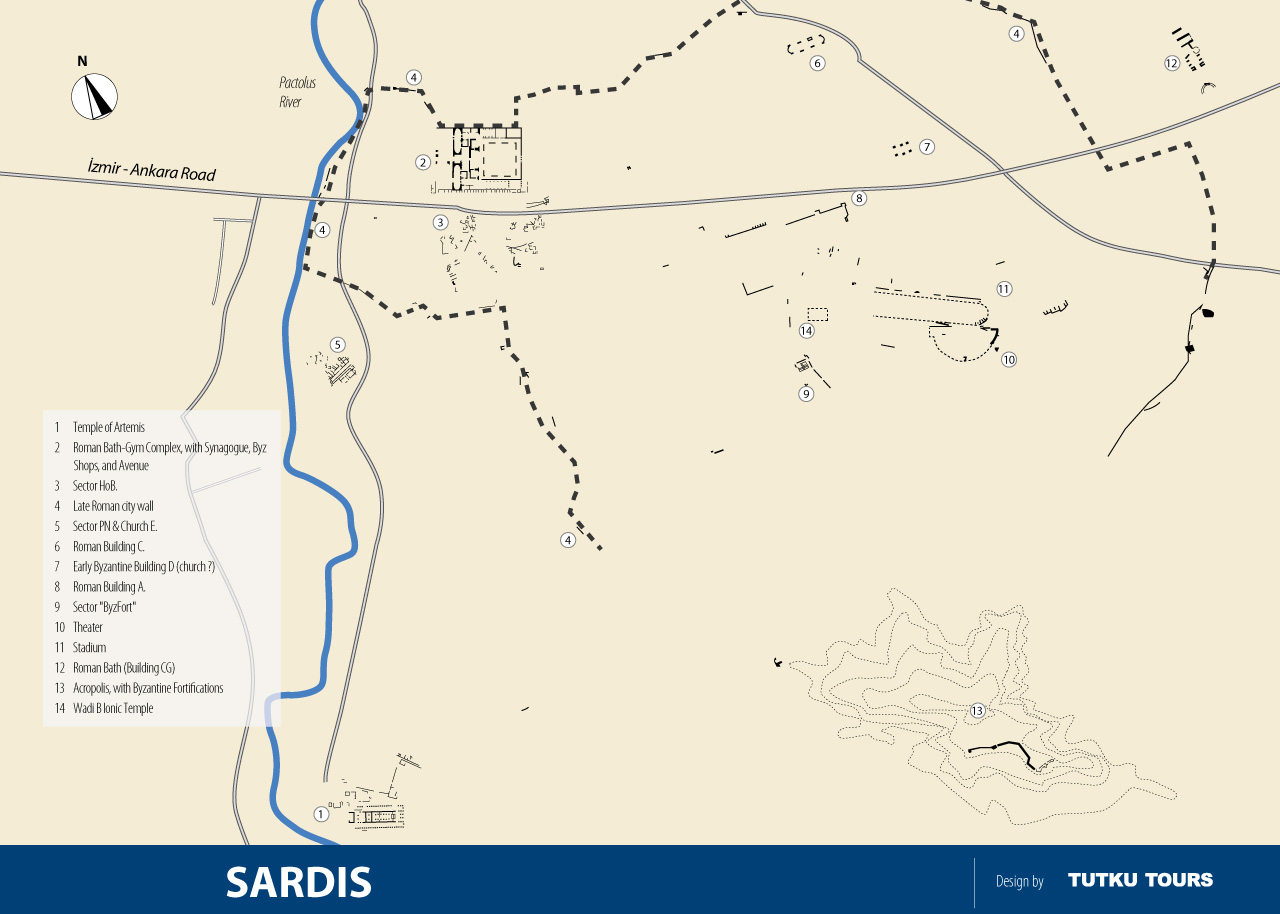
Select one of the Seven Cities in the Google Map (below), then select “View in Google Maps” on the left to explore each of the Seven Congregations of The Revelation.
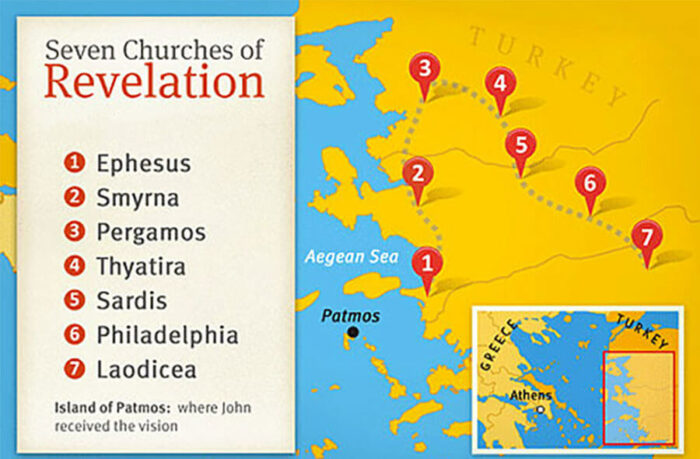
The Greeting
“To the angel of the church in Sardis write the following: “This is the solemn pronouncement of the one who holds the seven spirits of God and the seven stars: (Revelation 3:1 a NET)(cf. Revelation 1:4;5:6)
In His greeting to the Sardis congregation, the Lord identifies Himself as the One “who has the seven Spirits of God and the seven stars.” In the Bible, the number seven, when connected to God, means completeness. So when Jesus says He “has the seven Spirits of God,” (1) He is referring to the Holy Spirit (Hebrew, Ruach HaKodesh).
Isaiah speaks of the sevenfold character of the Holy Spirit and the Messiah:
And there shall come forth a rod out of the stem of Jesse, and a Branch shall grow out of his roots: And the spirit of the LORD shall rest upon him, the spirit of wisdom and understanding, the spirit of counsel and might, the spirit of knowledge and of the fear of the LORD (Isaiah 11:1,2 KJV)
The Hebrew word translated as “branch” is netzer, which means resident (Hb, natzrati) of Nazareth (Hb. Natzeret). Thus Isaiah is predicting that the sevenfold Spirit of God will rest upon the Nazarene.
Matthew refers to the Isaiah passage and says,
He came to a town called Nazareth and lived there. Then what had been spoken by the prophets was fulfilled, that Jesus would be called a Nazarene. (Matthew 2:23 NET)
In Israel today, Christians are called Notzrim, which means followers of the man from Natzeret. (2)
When Jesus was baptized, the Spirit of God rested or descended upon Him:
After Jesus was baptized, just as he was coming up out of the water, the heavens opened and he saw the Spirit of God descending like a dove and coming on him. And a voice from heaven said, “This is my one dear Son; in him I take great delight.” (Matthew 3:16–17 NET)
When Jesus began His ministry in Nazareth, He went to the synagogue and read Isaiah 61:1-2, which was the text for that particular Sabbath reading. Luke records it for us:
Now Jesus came to Nazareth, where he had been brought up, and went into the synagogue on the Sabbath day, as was his custom. He stood up to read, and the scroll of the prophet Isaiah was given to him. He unrolled the scroll and found the place where it was written, “The Spirit of the Lord is upon me, because he has anointed me to proclaim good news to the poor. He has sent me to proclaim release to the captives and the regaining of sight to the blind, to set free those who are oppressed, to proclaim the year of the Lord’s favor.” Then he rolled up the scroll, gave it back to the attendant, and sat down. The eyes of everyone in the synagogue were fixed on him. Then he began to tell them, “Today this scripture has been fulfilled even as you heard it being read.” (Luke 4:16–21 NET)
In Isaiah 42:1-4, God says He will put His Spirit on His Chosen One and the Gentiles will come to Him. Matthew refers to Isaiah 42 and says of Jesus:
Now when Jesus learned of this, he went away from there. Great crowds followed him, and he healed them all. But he sternly warned them not to make him known. This fulfilled what was spoken by Isaiah the prophet: “Here is my servant whom I have chosen, the one I love, in whom I take great delight. I will put my Spirit on him, and he will proclaim justice to the nations. He will not quarrel or cry out, nor will anyone hear his voice in the streets. He will not break a bruised reed or extinguish a smoldering wick, until he brings justice to victory. And in his name the Gentiles will hope.” (Matthew 12:15–21 NET)
Jesus not only tells the congregation that He has the Holy Spirit, but He also says that He has the seven stars, that represent the angels watching over the seven congregations (1). In other words, Jesus is aware of the condition of this church, He is Lord over His people, and the leaders are accountable to Him.
Why would the Lord greet them in this way? As we will discover next, they are spiritually dead and in great need of spiritual renewal and awakening. (2)
Sans Commendation
Regrettably, the Lord had nothing praiseworthy to say to the leaders or the congregation of Sardis as a whole. (2) Sardis and Laodicea are the only two churches out of the seven that do not receive some commendation.
The Rebuke and Exhortation
...‘I know your deeds, that you have a reputation that you are alive, but in reality you are dead. Wake up then, and strengthen what remains that was about to die, because I have not found your deeds complete in the sight of my God. Therefore, remember what you received and heard, and obey it, and repent. If you do not wake up, I will come like a thief, and you will never know at what hour I will come against you. (Revelation 3:1b;3:2,3 NET)
When He says He knows their works, He is informing them that He is fully and completely aware of their spiritual condition. While they have a reputation as being an “alive congregation,” except for a few, they are spiritually dead. (2)
The congregation was a mirror image of the city. Sardis boasted of its past glory and greatness. It had a name or reputation throughout the region for its fortress location, its wealth, its textile industry, and its great temple to Artemis. While the city worked hard to recover from the earthquake, it would never regain its place of prominence. The once-great, proud city was in decline.
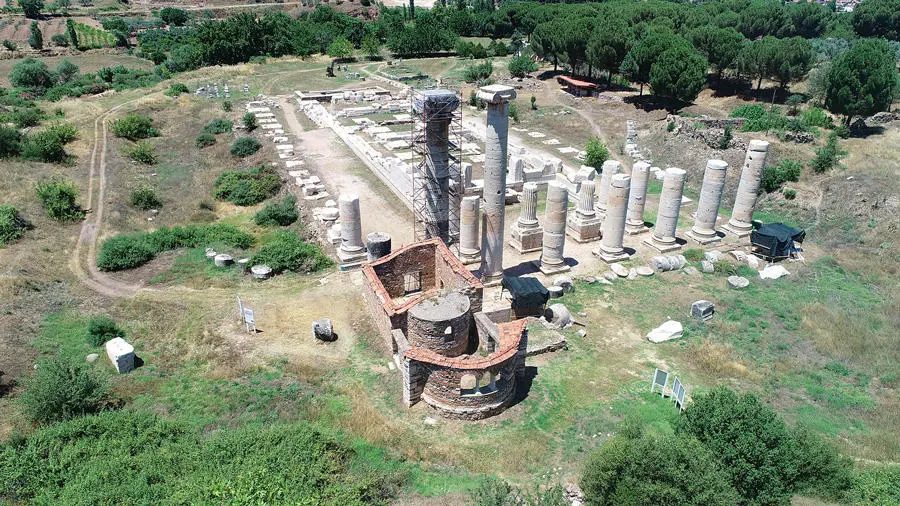
Likewise, the community of believers at Sardis gloried in its past. We do not know who first brought the Gospel to Sardis or when the congregation was birthed. But, like the city, the congregation must have had an exciting spiritual history. It was still known throughout the region for its spiritual reputation. (2)
But that was all in the past. Now, they were spiritually dead and in great need of renewal and revival. This is why Jesus greeted them as the One who has the Holy Spirit. They need a fresh outpouring of the Holy Spirit to renew their spiritual strength and vitality. Like the temple to Artemis, which was never completed, the local congregation of believers had not completed the work the Lord wanted to accomplish at Sardis. (2)
There are entire denominations and many local congregations today that are just like the believers at Sardis. They have had wonderful spiritual experiences with God in the past but not much lately. They talk about how God worked powerfully through the founders of their denomination or congregation. That was all in the past. While they glory in the past, they do not have a current testimony of the Lord working in their midst. Maintaining their traditions has become more important to them than a fresh move of God. They are more concerned with form than they are with spiritual life. They love their system more than they love the Lord. They have replaced a dynamic relationship with the Lord with their programs.
They may have beautiful buildings and even stained glass windows, but they have no life. They have a name or reputation in the city, but they are spiritually dead. They need a fresh outpouring of the Spirit of the Living God. The Lord tells them five things they must do or else they will not survive.
1. Wake Up
...‘I know your deeds, that you have a reputation that you are alive, but in reality you are dead. Wake up then, and strengthen what remains that was about to die, because I have not found your deeds complete in the sight of my God. Therefore, remember what you received and heard, and obey it, and repent. If you do not wake up, I will come like a thief, and you will never know at what hour I will come against you. (Revelation 3:1b;3:2,3 NET)
First, He tells them to wake up! In Bible times, one of the most critical positions in a city was that of the watchman. The watchman had only one responsibility, which was to stay at his post on the city wall and watch for any approaching enemy. The whole city depended on the watchman. He had to be awake and sober. As soon as the watchman saw the enemy approaching, he would sound an alarm so the people could prepare to defend themselves. (2)
We can clearly see how the role of the watchman was so critical at Sardis. Because of their strategic location, Sardis thought it was safe from any attack. As a result, the city did not post a watchman to guard the city. Due to this false confidence, Sardis was defeated on two different occasions by a surprise night attack. (2)
The community of believers had made the same mistake. They had not been watching for their spiritual enemies, who were always looking for an opportunity to attack them. The congregation was not alert. They were complacent, thinking that their glorious past was enough to protect them from spiritual decline. The Lord is warning them that they will not survive unless they wake up spiritually. (2)
This Word is certainly relevant today as the historic protestant denominations, many local congregations, and individual believers have gone to sleep spiritually. They need to wake up. They have not fulfilled their high calling and destiny as a witness to the love and power of God. (2)
But understand this, that in the last days difficult times will come. For people will be lovers of themselves, lovers of money, boastful, arrogant, blasphemers, disobedient to parents, ungrateful, unholy, unloving, irreconcilable, slanderers, without self-control, savage, opposed to what is good, treacherous, reckless, conceited, loving pleasure rather than loving God. They will maintain the outward appearance of religion but will have repudiated its power. So avoid people like these. (2 Timothy 3:1–5 NET)
Paul wrote to the believers at Ephesus (A composite quotation, possibly from Isaiah 26:19;51:17; 52:1;60:1). (4)
For everything made evident is light, and for this reason it says: “Awake, O sleeper! Rise from the dead, and Christ will shine on you!” (Ephesians 5:14 NET)
2. Strengthen What Remains
...‘I know your deeds, that you have a reputation that you are alive, but in reality you are dead. Wake up then, and strengthen what remains that was about to die, because I have not found your deeds complete in the sight of my God. Therefore, remember what you received and heard, and obey it, and repent. If you do not wake up, I will come like a thief, and you will never know at what hour I will come against you. (Revelation 3:1a;3:2,3 NET)
The second thing the Lord tells them to do is to strengthen the things which remain, as the little spiritual life they have is about to die. When Sardis realized it was under attack, the citizens did the best they could to defend themselves. They desperately tried to repair the breaches in the walls and reinforce or strengthen what had not yet fallen (that which remained). But it was too little, too late. Sardis fell and the defenders of the city died. (2)
The Lord uses the history of Sardis as a warning to the congregation. If they do not wake up and seek God for a fresh outpouring of His Spirit, the little spiritual life they have left will also die. Any discerning spiritual leader, as well as ordinary believers, should realize this Word is clearly relevant for us today. Because they have forsaken God’s Word and compromised their convictions, the historic Christian denominations are dying physically and spiritually before our eyes. If they do not strengthen the little spiritual life they have left, they will be completely dead. (2)
The same is true for many local assemblies of believers as well as individuals who profess Christianity. Let us humbly examine ourselves to see how this word from the Lord might apply to our own Christian life and experience. Are we dead or alive? Do we glory only in what God did in the past, or do we have a fresh testimony of God’s Spirit working in our lives? (2)
3. Remember
...‘I know your deeds, that you have a reputation that you are alive, but in reality you are dead. Wake up then, and strengthen what remains that was about to die, because I have not found your deeds complete in the sight of my God. Therefore, remember what you received and heard, and obey it, and repent. If you do not wake up, I will come like a thief, and you will never know at what hour I will come against you. (Revelation 3:1b;3:2,3 NET)
The third word the Lord gave to the congregation at Sardis was to remember. He calls them to remember how they had received and heard. What had they received and heard? They had received and heard the Word of God. It is God’s holy Word ministered in the power of the Holy Spirit that changes lives.
Peter explained:
Above all, you do well if you recognize this: No prophecy of scripture ever comes about by the prophet’s own imagination, for no prophecy was ever borne of human impulse; rather, men carried along by the Holy Spirit spoke from God. (2 Peter 1:20–21 NET)
Paul explained to Timothy:
You, however, must continue in the things you have learned and are confident about. You know who taught you and how from infancy you have known the holy writings, which are able to give you wisdom for salvation through faith in Christ Jesus. Every scripture is inspired by God and useful for teaching, for reproof, for correction, and for training in righteousness, that the person dedicated to God may be capable and equipped for every good work. (2 Timothy 3:14–17 NET)
In these passages, Peter and Paul explain the Scriptures are “God-inspired,” meaning that God spoke His words out of His own mouth. Whatever God speaks has God’s own life in His words. Therefore, God’s spoken Words have the power to change people’s lives. (2)
Paul further exhorted Timothy:
I solemnly charge you before God and Christ Jesus, who is going to judge the living and the dead, and by his appearing and his kingdom: Preach the message, be ready whether it is convenient or not, reprove, rebuke, exhort with complete patience and instruction. For there will be a time when people will not tolerate sound teaching. Instead, following their own desires, they will accumulate teachers for themselves, because they have an insatiable curiosity to hear new things. And they will turn away from hearing the truth, but on the other hand they will turn aside to myths. You, however, be self-controlled in all things, endure hardship, do an evangelist’s work, fulfill your ministry. (2 Timothy 4:1–5 NET)
The community of believers at Sardis was no longer preaching and teaching God’s Holy Word. As a result, the people were not being grounded in their faith; they were not being convicted about their sins; they were not being corrected and challenged; they were not being taught. They were losing their witness to the city. The solution to this condition was to get back to the basics of proclaiming the Word of God! (2)
Jesus rebuked the Pharisees and experts in the law applying Isaiah29:13,
He said to them, “Isaiah prophesied correctly about you hypocrites, as it is written: ‘This people honors me with their lips, but their heart is far from me. They worship me in vain, teaching as doctrine the commandments of men.’ Having no regard for the command of God, you hold fast to human tradition. ”He also said to them, “You neatly reject the commandment of God in order to set up your tradition. For Moses said, ‘Honor your father and your mother,’ and, ‘Whoever insults his father or mother must be put to death.’But you say that if anyone tells his father or mother, ‘Whatever help you would have received from me is corban’ (that is, a gift for God), then you no longer permit him to do anything for his father or mother. Thus you nullify the word of God by your tradition that you have handed down. And you do many things like this.” (Mark 7:6–13 NET)
Is this warning from the Lord relevant to us today? Unfortunately, the answer is yes! Once again, we see that much of Western and American Christianity no longer believes nor proclaims God’s Word. Under the banner of the “Higher Criticism” of Scriptures, seminaries teach their future ministers that the Bible is not really the Word of God, that the miracles of Jesus are “fairy tales,” and that the Bible is an antiquated book written by men that is not relevant to our modern world. (2)
When the seminary students graduate and are given a congregation, they pass on what they have learned to their congregants. The result is that church buildings all across America are filled with decent people who don’t hear the Word of God, don’t know the Word of God, and don’t believe the Word of God. (2)
The denominational leaders need to remember that it was the Word of God that was working mightily through their founders. They need to return to proclaiming God’s Holy Word. If they don’t heed this warning, what little spiritual life they have left will die. If these words pierce your heart, then do what the Lord says. Let God use you to bring spiritual renewal to your denomination and the local congregation. Do it now while there is still a little life left. (2)
4. Obey it
...‘I know your deeds, that you have a reputation that you are alive, but in reality you are dead. Wake up then, and strengthen what remains that was about to die, because I have not found your deeds complete in the sight of my God. Therefore, remember what you received and heard, and obey it, and repent. If you do not wake up, I will come like a thief, and you will never know at what hour I will come against you. (Revelation 3:1b;3:2,3 NET)
The fourth instruction the Lord gave to the believers at Sardis was to obey it. Some Bible versions translate the phrase obey it as hold fast. To obey or hold fast to something means to cling to it with all your might and not let go. (2)
What does the Lord want them to hold fast and obey? In the context of His letter, He wants them to hold fast and obey what He has told them. He wants them to be watchful of their spiritual condition, to strengthen the spiritual life that remains, and to remember to proclaim His Word. (2)
Sardis did its best to hold on to its past, but it failed. The city was in a state of perpetual decline. It never regained its prominence. As mentioned earlier, when Sardis petitioned Rome to establish the temple for emperor worship, Rome rejected the petition. The Lord warns the congregation at Sardis that they will end up just like the city unless they hold fast and obey His prophetic word to them. (2)
Paul gave a similar exhortation to Timothy:
Hold to the standard of sound words that you heard from me and do so with the faith and love that are in Christ Jesus. Protect that good thing entrusted to you, through the Holy Spirit who lives within us. (2 Timothy 1:13–14 NET)
Once again we ask the question, “Are the Lord’s words relevant to the Christian world of today?” Do Christian leaders today need to be watchful of their spiritual condition? Do they need to strengthen the little spiritual life that remains? Do they need to remember to proclaim the Word of God? Absolutely, the answer is yes! If they want to regain their spiritual life, they must do these things. They must do them now! This leads us to the fifth statement that the Lord made to the believers at Sardis. (2)
5. Repent
...‘I know your deeds, that you have a reputation that you are alive, but in reality you are dead. Wake up then, and strengthen what remains that was about to die, because I have not found your deeds complete in the sight of my God. Therefore, remember what you received and heard, and obey it, and repent. If you do not wake up, I will come like a thief, and you will never know at what hour I will come against you. (Revelation 3:1b;3:2,3 NET)
Jesus told them to repent. The believers at Sardis had a religious spirit, but they did not have the Holy Spirit working in their midst. They had dead works, not spiritual ministry. They preached sermons but did not proclaim the Word of God. They had form without function and rituals without revival. They had creeds without deeds, services without serving, and meetings without ministry. (2)
6. Consequence of not Responding to the Lord’s Warning
...‘I know your deeds, that you have a reputation that you are alive, but in reality you are dead. Wake up then, and strengthen what remains that was about to die, because I have not found your deeds complete in the sight of my God. Therefore, remember what you received and heard, and obey it, and repent. If you do not wake up, I will come like a thief, and you will never know at what hour I will come against you. (Revelation 3:1b;3:2,3 NET)
They must awaken to their spiritual condition, strengthen the little that remains, proclaim God’s Word, hold fast, obey the Lord’s warnings, and repent. If they do not do these things, the Lord will come when they least expect it, to judge them. They will be as unprepared and surprised as the city of Sardis was when it was overthrown by a surprise attack at night. The Lord Himself will withdraw His presence, His protection, and His provision, and they will not survive as a believing community. (2)
The Lord is certainly calling Western Christianity to repent of the same issues He raised with the believers at Sardis. If we do not respond to His grace and mercy, we will see His holy justice. Many believe this is already happening. You can be a part of the solution and not the problem by acting on the Lord’s Words. (2)
The Promise
But you have a few individuals in Sardis who have not stained their clothes, and they will walk with me dressed in white, because they are worthy. The one who conquers will be dressed like them in white clothing, and I will never erase his name from the book of life, but will declare his name before my Father and before his angels. The one who has an ear had better hear what the Spirit says to the churches.’ (Revelation 3:4–6 NET)
Although the Lord has nothing praiseworthy to say to the leaders or the congregation as a whole, He does say that there are a few believers who have remained faithful. Throughout history, no matter how much organized Christianity has failed, God has always had a remnant that stayed true to the faith and lived godly lives. They often were persecuted, and many were martyred, but they persevered. (2)
1. White Garments
But you have a few individuals in Sardis who have not stained their clothes, and they will walk with me dressed in white, because they are worthy. The one who conquers will be dressed like them in white clothing, and I will never erase his name from the book of life, but will declare his name before my Father and before his angels. The one who has an ear had better hear what the Spirit says to the churches.’ (Revelation 3:4–6 NET)
The Lord made the following promise to this faithful remnant. First He acknowledges their faithfulness by saying they have not defiled or soiled their garments. Ordinary people of the Greco-Roman world wore white garments at religious ceremonies and in victory parades. When the Roman general returned to Rome after defeating the enemy, Rome had a great victory parade called “The Parade of Triumph.” All the citizens of Rome turned out for the parade, and they all wore clean white garments.
As mentioned previously, there were many priests who wore white garments while serving at the great temple of Artemis. They certainly would not wear a soiled garment, as that would be a sign of defilement. They would not be worthy to serve at the temple.
We have an example of this in Zechariah, with Joshua the high priest standing before the Angel of the Lord in soiled garments. Zechariah writes:
Next I saw Joshua the high priest standing before the angel of the Lord, with Satan standing at his right hand to accuse him. The Lord said to Satan, “May the Lord rebuke you, Satan! May the Lord, who has chosen Jerusalem, rebuke you! Isn’t this man like a burning stick snatched from the fire?” Now Joshua was dressed in filthy clothes as he stood there before the angel. The angel spoke up to those standing all around, “Remove his filthy clothes.” Then he said to Joshua, “I have freely forgiven your iniquity and will dress you in fine clothing.” Then I spoke up, “Let a clean turban be put on his head.” So they put a clean turban on his head and clothed him, while the angel of the Lord stood nearby. Then the angel of the LORD exhorted Joshua solemnly: “The LORD who rules over all says, ‘If you live and work according to my requirements, you will be able to preside over my temple and attend to my courtyards, and I will allow you to come and go among these others who are standing by you. Listen now, Joshua the high priest, both you and your colleagues who are sitting before you, all of you are a symbol that I am about to introduce my servant, the Branch. As for the stone I have set before Joshua—on the one stone there are seven eyes. I am about to engrave an inscription on it,’ says the LORD who rules over all, ‘to the effect that I will remove the iniquity of this land in a single day. In that day,’ says the LORD who rules over all, ‘everyone will invite his friend to fellowship under his vine and under his fig tree.’ ” (Zechariah 3:1–10 NET)
Then I heard what sounded like the voice of a vast throng, like the roar of many waters and like loud crashes of thunder. They were shouting: “Hallelujah! For the Lord our God, the All-Powerful, reigns! Let us rejoice and exult and give him glory, because the wedding celebration of the Lamb has come, and his bride has made herself ready. She was permitted to be dressed in bright, clean, fine linen” (for the fine linen is the righteous deeds of the saints). (Revelation 19:6–8 NET)
With this background information on both the secular and spiritual connotation of clean, white garments, we can better understand and appreciate the first promise the Lord gives to the faithful remnant. He says that they will walk with Him in white garments. The white garments symbolized moral and spiritual purity and victory over the enemy. The Lord made this promise to the faithful because they were living pure lives and were victorious over the spiritual challenges they faced. The Lord says they are worthy. In other words, they have clean garments. (2)
There is worthiness that is imputed to us by the righteousness of Jesus which is credited to us when we put our faith and trust in Him as our perfect representative before God. But there is also an imparted righteousness that is based on our walk with God. Jesus says that the remnant is worthy because they have not soiled their garments. (2)
What this means is that while our eternal destiny in Heaven is based on the righteousness of Jesus, our actual place and glory in Heaven is based on our operationalizing the divinely imparted righteousness to live holy lives and walk in victory over sin. While all true believers will be in the great Parade of Triumph in Heaven, those who have lived godly lives and have overcome spiritual conflict will be, we might say, at the head of the parade. The Book of Revelation mentions white garments six additional times. (Revelation 3:18; 4:4; 6:11; 7:9,13; 19:14.) (2)
2. Names are Permanent in the Book of Life
But you have a few individuals in Sardis who have not stained their clothes, and they will walk with me dressed in white, because they are worthy. The one who conquers will be dressed like them in white clothing, and I will never erase his name from the book of life, but will declare his name before my Father and before his angels. The one who has an ear had better hear what the Spirit says to the churches.’ (Revelation 3:4–6 NET)
The second promise the Lord makes to the faithful at Sardis is that He will not erase their names from the Book of Life. In ancient times, cities had a registry book that listed the names of all the citizens. When they died, or if they had committed a crime, their names would be erased from the book of citizens. (2)
Isaiah tells us that the citizens in Jerusalem have their names in the city registry:
And he who is left in Zion and remains in Jerusalem will be called holy, everyone who has been recorded for life in Jerusalem, (Isaiah 4:3 ESV)
We have similar registry books today. For example, we have to register for social security, get our driver’s license or voter ID, join an organization, be put on a mailing list, or be placed on the roll of a local congregation. If we die or commit a crime, our names are removed or, using Bible language, blotted out from the registry. (2)
Likewise, the Bible says that God has a registry of all the citizens of Heaven. It is called the Book of Life. We first hear about this “heavenly registry” in the Book of Exodus when Moses pleaded with God not to blot out the children of Israel from His Book. This was when they had made a golden calf as an idol. God was very angry with the people to the point that Moses interceded for them.
Exodus records the following conversation:
The next day Moses said to the people, “You have committed a very serious sin, but now I will go up to the Lord—perhaps I can make atonement on behalf of your sin.” So Moses returned to the Lord and said, “Alas, this people has committed a very serious sin, and they have made for themselves gods of gold. But now, if you will forgive their sin …, but if not, wipe me out from your book that you have written.” The Lord said to Moses, “Whoever has sinned against me—that person I will wipe out of my book. (Exodus 32:30–33 NET)
Of course, we have all sinned and deserve to have our names blotted out of God’s heavenly register. This is why we need the righteousness of Jesus. But this Scripture, as well as others, and history and experience, clearly teach us that not everyone who claims to be a believer has a personal relationship with God. This was certainly the situation at Sardis. Most of the people had their names on the “church rolls” but were not true believers. God’s promise was not to them but to the overcoming remnant.
In the Book of Psalms, the writer urges God to blot out the names of the wicked from His book.
May their names be deleted from the scroll of the living! Do not let their names be listed with the godly! (Psalm 69:28 NET)
In Daniel, we learn that the persecution against the Jews during the tribulation period will be so severe that Michael, the guardian angel of Israel, will have to fight on their behalf. Yet God will deliver everyone whose name is written in the book. (2)
“At that time Michael, the great prince who watches over your people, will arise. There will be a time of distress unlike any other from the nation’s beginning up to that time. But at that time your own people, all those whose names are found written in the book, will escape. Many of those who sleep in the dusty ground will awake— some to everlasting life, and others to shame and everlasting abhorrence. But the wise will shine like the brightness of the heavenly expanse. And those bringing many to righteousness will be like the stars forever and ever. (Daniel 12:1–3 NET)
Since the New Testament is a Jewish book written by Jews, we should expect to find similar statements. Luke tells us that Jesus gave His disciples spiritual authority over demons. When the disciples rejoiced over their new power, Jesus rebuked them and reminded them of what was really important. (2)
Then the seventy-two returned with joy, saying, “Lord, even the demons submit to us in your name!”So he said to them, “I saw Satan fall like lightning from heaven. Look, I have given you authority to tread on snakes and scorpions and on the full force of the enemy, and nothing will hurt you. Nevertheless, do not rejoice that the spirits submit to you, but rejoice that your names stand written in heaven.” (Luke 10:17–20 NET)
Paul wrote to the believers at Philippi:
Yes, I say also to you, true companion, help them. They have struggled together in the gospel ministry along with me and Clement and my other coworkers, whose names are in the book of life. (Philippians 4:3 NET)
The writer of Hebrews encourages the believers with these words:
But you have come to Mount Zion, the city of the living God, the heavenly Jerusalem, and to myriads of angels, to the assembly and congregation of the firstborn, who are enrolled in heaven, and to God, the judge of all, and to the spirits of the righteous, who have been made perfect, and to Jesus, the mediator of a new covenant, and to the sprinkled blood that speaks of something better than Abel’s does. (Hebrews 12:22–24 NET)
In Revelation we learn that those who worship the Beast do not have their names written in God’s heavenly register:
and all those who live on the earth will worship the beast, everyone whose name has not been written since the foundation of the world in the book of life belonging to the Lamb who was killed. (Revelation 13:8 NET)
In Revelation, at the Great White Throne of Judgement we learn that those who do not have their names written in God’s heavenly register are thrown into the lake of fire for an eternity:
Then I saw a large white throne and the one who was seated on it; the earth and the heaven fled from his presence, and no place was found for them. And I saw the dead, the great and the small, standing before the throne. Then books were opened, and another book was opened—the book of life. So the dead were judged by what was written in the books, according to their deeds. The sea gave up the dead that were in it, and Death and Hades gave up the dead that were in them, and each one was judged according to his deeds. Then Death and Hades were thrown into the lake of fire. This is the second death—the lake of fire. If anyone’s name was not found written in the book of life, that person was thrown into the lake of fire. (Revelation 20:11–15 NET)
As it was at Sardis, there are millions of people today who profess Christianity but who do not have a personal relationship with the Lord. Their names are on the church roll but are not written in the Book of Life. The good news is that God knows the difference between those who profess Him and those who possess Him. God knows those who are His. (2)
Moses writes,
Then he said to Korah and to all his company, “In the morning the Lord will make known who are his, and who is holy. He will cause that person to approach him; the person he has chosen he will cause to approach him. (Numbers 16:5 NET)
The Apostle Paul quotes Moses and writes to Timothy:
However, God’s solid foundation remains standing, bearing this seal: “The Lord knows those who are his,” and “Everyone who confesses the name of the Lord must turn away from evil.” (2 Timothy 2:19 NET)
John writes about the New Jerusalem,
Now I saw no temple in the city, because the Lord God—the All-Powerful—and the Lamb are its temple. The city does not need the sun or the moon to shine on it, because the glory of God lights it up, and its lamp is the Lamb. The nations will walk by its light and the kings of the earth will bring their grandeur into it. Its gates will never be closed during the day (and there will be no night there). They will bring the grandeur and the wealth of the nations into it, but nothing ritually unclean will ever enter into it, nor anyone who does what is detestable or practices falsehood, but only those whose names are written in the Lamb’s book of life. (Revelation 21:22–27 NET)
3. Name Declared to God our Father and His Angels
But you have a few individuals in Sardis who have not stained their clothes, and they will walk with me dressed in white, because they are worthy. The one who conquers will be dressed like them in white clothing, and I will never erase his name from the book of life, but will declare his name before my Father and before his angels. The one who has an ear had better hear what the Spirit says to the churches.’ (Revelation 3:4–6 NET)
The third promise the Lord made to the faithful at Sardis is that He will acknowledge them before His Father and His angels. The small remnant of true believers was probably doing all they could to bring renewal to the congregation. But like in many of our modern traditional Christian denominations and local assemblies, their efforts were often not recognized nor appreciated. In spite of their best efforts, the entrenched leadership did not embrace their pleas for spiritual renewal. (2)
The Son of Man gives His Word to the overcomers that He will acknowledge them. The Lord’s promise is a combination of His statements recorded in Matthew and Luke.
In the Matthew passage, Jesus says,
“Whoever, then, acknowledges me before people, I will acknowledge before my Father in heaven. But whoever denies me before people, I will deny him also before my Father in heaven. (Matthew 10:32–33 NET)
In the Luke passage, Jesus says,
“I tell you, whoever acknowledges me before men, the Son of Man will also acknowledge before God’s angels. But the one who denies me before men will be denied before God’s angels. (Luke 12:8–9 NET)
This is certainly an encouraging word to all of God’s people who feel they are a struggling spiritual minority in their denomination or local congregation. The Lord Himself will acknowledge you as His own. What greater blessing and reward could we ever possibly desire than this? (2)
Finally, as with all the other prophetic messages, Jesus says that we have a responsibility to listen to God’s voice through the Holy Spirit. The fact that the Lord tells us to listen to hear His words means that He is still speaking to us today and that we can hear and understand His words. (1)(2)
The Lord speaks to each one of us personally based on our individual lives, much like parents would speak differently to their children based on their needs. As we obey what the Holy Spirit tells us, we overcome that need in our lives and receive the promise God makes to us. Thus, the way we live now determines the glory that God has for us in the hereafter. (2)
If the Lord’s message to Sardis applies to your organization, your ministry, or your life, let us repent and do what He says so we can be overcomers. Let us heed the words of our Lord while we still have a little life: (2)
“Blessed are those who hunger and thirst for righteousness, for they will be satisfied. (Matthew 5:6 NET)
Ten Signs that a Church or Believer Is in Trouble
To help you avoid falling into the same lifeless condition that the church of Sardis experienced, here are ten warning signs that a church (or an individual believer) is in danger: (3)
Sign 1: It lives in its memories. That was the problem with Sardis; its past memories were greater than its present reality, and that is where the people were living.
Sign 2: It no longer reaches unsaved people. This means no new life is flowing into the church. It has become self-focused and ingrown. This is a sign of spiritual sickness.
Sign 3: It is stagnant in terms of growth. This is the result of being inwardly focused.
Sign 4: It curtails its missions giving. In other words, it becomes like the Dead Sea, which is a body of water that just receives, but it never gives. There is no outlet for it to flow into. As a result of only receiving, it is absent of life. Hence, it is called the Dead Sea. Anything that doesn’t give dies. When a church curtails its giving to missions, it’s a sign that it is in trouble.
Sign 5: It experiences a decrease in spiritual gifts. In this case, the Holy Spirit is likely grieved, and His gifts begin to dissipate or fade from the church gatherings.
Sign 6: It is void of joy and excitement. This also is likely the result of the Holy Spirit being grieved.
Sign 7: It treats the Bible as a resource among other resources. The Word of God begins to lose its authoritative voice and value — another major sign that a church is in trouble.
Sign 8: It may be materially blessed and financially rich, but it is unable to meet the spiritual needs of people in the congregation.
Sign 9: It loses or forgets its vision. The Bible clearly says that without a vision, people perish (see Proverbs 29:18).
Sign 10: It becomes like a spiritual mannequin. A mannequin looks like a real person. You can even dress it up with all the right clothes, but it is still powerless and lifeless. This is exactly what the apostle Paul referred to in Second Timothy 3:5 when he talked about those who have a form of godliness but lack the power thereof. (3)
The Invitation
IF there was ever a congregation that needed a spiritual revival, it was the one at Sardis. While they must have had an exciting beginning, Jesus told them they were spiritually dead. This is why He greeted them as the One who has the seven Spirits of God, that is, the Holy Spirit. (2)
God’s life is in His Spirit. We must have an ongoing, fresh experience with the Holy Spirit in order to stay spiritually alive and vibrant. Jesus said that His followers would have rivers of living water flowing in them.
On the last day of the feast, the greatest day, Jesus stood up and shouted out, “If anyone is thirsty, let him come to me, and let the one who believes in me drink. Just as the scripture says, ‘From within him will flow rivers of living water.’ ”(Now he said this about the Spirit, whom those who believed in him were going to receive, for the Spirit had not yet been given, because Jesus was not yet glorified.) (John 7:37–39 NET) (cf. Isaiah 44:3;55:1;58:11, and Zechariah 14:8)
Can we honestly say that this describes our spiritual condition?
When Jesus spoke of living waters flowing in the believer’s heart, He surely was referring to Jeremiah’s words of the Messiah’s rejection,
“Do so because my people have committed a double wrong: they have rejected me, the fountain of life-giving water, and they have dug cisterns for themselves, cracked cisterns which cannot even hold water.” (Jeremiah 2:13 NET)
You are the one in whom Israel may find hope. All who leave you will suffer shame. Those who turn away from you will be consigned to the nether world. For they have rejected you, the Lord, the fountain of life. (Jeremiah 17:13 NET)
What is God talking about here? He is contrasting spiritual life that comes from a relationship with Him to dead religion. There is an infinite difference between having religion and having a relationship with God. It is possible to have a religion about God without having a personal relationship with God. (2)
In the Jeremiah verse, God mentions broken cisterns that do not hold water. God does not pour His life into a religion; He pours it into people. Religions are man’s attempts to understand and explain God to people. But if the people who are in the religious organizations are not filled with God’s Spirit, the organization becomes a broken cistern. It is also true of our individual lives. This is what God is meaning for us to understand through the words of the prophet. (2)
When Jesus told the believers at Sardis that He knew their works, He was not giving them a compliment. He was giving them a warning. They had better wake up spiritually, or the little life they have left will be gone. The Lord does acknowledge a remnant in the congregation who still have some life. As with the other congregations, Jesus promises blessings to the overcomers but has harsh words for those who fail to repent. (2)
What an exciting privilege it would have been to witness and participate in the mighty moves of God that changed the world, such as when Luther realized that salvation was a free gift from God and not something we can earn. Or when God used John and Charles Wesley to preach their message of sanctification and holiness, etc. (2)
These mighty moves of God were birthed by men and women who were filled with God’s Spirit to overflowing. The river of God’s life poured out of them with such a force that God used them to change the world. God worked through them to create a movement of people responding to the outpouring of God’s Spirit. These movements evolved into denominations that sought to carry on the vision of the spiritual pioneers they followed. However, over time these denominations evolved into religious organizations. Unfortunately, today, many of them are spiritually dead.
This same process can happen in the life of local congregations as well as in our own lives. Let us accept Paul’s admonition: (2)
And do not get drunk with wine, which is debauchery, but be filled by the Spirit,speaking to one another in psalms, hymns, and spiritual songs, singing and making music in your hearts to the Lord, always giving thanks to God the Father for each other in the name of our Lord Jesus Christ, and submitting to one another out of reverence for Christ. (Ephesians 5:18–21 NET)
“I, Jesus, have sent my angel to testify to you about these things for the churches. I am the root and the descendant of David, the bright morning star!” And the Spirit and the bride say, “Come!” And let the one who hears say: “Come!” And let the one who is thirsty come; let the one who wants it take the water of life free of charge. (Revelation 22:16–17 NET)
Seven Church Conditions during the Church Age:
Please see the following links for more information from Revelation Chapters 1-3 concerning the condition of churches during the Church Age:
- Prologue
- Jesus the Messiah!
- The Legalistic Congregation (Ephesus)
- The Persecuted and Faithful Congregation (Smyrna)
- The Persecuted and Compromised Congregation (Pergamos)
- The Licentious Congregation (Thyatira)
- The Dying Congregation (Sardis)
- The “Canceled” and Faithful Congregation (Philadelphia)
- The Dead Congregation (Laodicea)
Shalom
(Security, Wholeness, Success)
Peace
Then he said to them, “Therefore every expert in the law who has been trained for the kingdom of heaven is like the owner of a house who brings out of his treasure what is new and old.” (Matthew 13:52 NET)
(1) Select the link to open another article with additional information in a new tab.
(2) Booker, R. (2011). The overcomers: series- understanding the book of Revelation. Shippensburg, PA: Destiny Image.
(3) Renner, R. (2019). Companion study guide: Christ’s message to Sardis. Rick Renner Ministries. www.renner.org
(4) Biblical Studies Press, The NET Bible First Edition; Bible. English. NET Bible.; The NET Bible (Biblical Studies Press, 2005).
(5) Pictures from: Bolen, T. Pictorial Library of Bible Lands, Volumes 1-20 Purchased from https://www.bibleplaces.com and used with permission.




